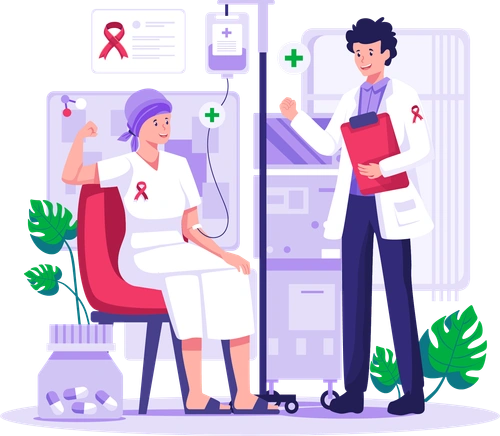
Does Medicare Cover Cancer Treatments?
Does Medicare cover cancer treatments? Absolutely. In fact, the American Cancer Society has statistics that show that Medicare pays about half of the $74 billion spent annually on cancer treatment. Obviously, having a strong cancer insurance benefit is important.
While undergoing cancer treatments is overwhelming, you’ll have peace of mind knowing you have great coverage under Medicare, especially if you combine your Original Medicare coverage with a Medigap plan. Let’s take a deeper dive into how Medicare covers cancer treatment.
Cancer Coverage with Medicare
Original Medicare (Parts A and B) offers coverage for a variety of cancer treatments. Those benefits include:
-
Surgeries related to cancer
-
Inpatient hospital cancer care
-
Second opinion consultations
-
Visits to your oncologist and other physicians
-
Radiation
-
Chemotherapy
-
Medications for chemotherapy
-
Medications for side effects, like those used to treat nausea
-
Skilled nursing for cancer recovery
-
Participation in clinical trials for experimental treatments via clinical studies
-
Durable medical equipment
-
Home health services
-
Short-term nursing home care
-
Physical therapy and rehabilitation
-
Hospice care
The amount you’ll owe for these services depends on which part of Medicare they fall under. Parts A and B each have their own deductibles and cost-sharing amounts. For example, chemotherapy can be given on an inpatient or outpatient basis. If it’s inpatient, it’ll fall under Part A. Outpatient chemo will fall under Part B. Of course, if you have a Medicare Advantage plan instead of Original Medicare, all your claims will go directly to the Medicare Advantage plan carrier.
Medicare Part A Cancer Costs
Medicare Part A will cover cancer treatments you get while you’re an inpatient at a hospital. The Part A deductible in 2024 is $1,632, which you’ll need to meet before coverage kicks in. Outside of that amount, Part A covers 100% of the costs within the first 60 days of your hospital stay. After that, you’ll have a copayment for each day you spend in the hospital.
Part A will also cover cancer treatments you have while at a skilled nursing facility. However, in this case, your 100% coverage will only last for the first 20 days.
Of course, if you have a Medigap plan, you likely will not owe the Part A deductible or copayments. This applies if you have any of the popular Medigap plans, like Plans F, G, or N.
Medicare Part B Cancer Costs
Medicare Part B covers many cancer screenings at no charge to you as part of its preventive care coverage. It will also pay for chemotherapy and radiation performed at a doctor’s office or clinic.
Part B also has a deductible, which is set at $240 in 2024. Once you meet the deductible, Medicare covers 80% of the cost of cancer treatments, leaving you with the remaining 20%. An important thing to understand, however, is that there is no cap on that 20%.
This is why it’s important to have supplemental coverage. As we mentioned earlier, if you have a Medigap plan, you may not be responsible for most of these costs. For example, Plan G will pick up all coinsurance costs. The only thing you’ll be responsible for is the Part B deductible.
Medicare Advantage Cancer Costs
Medicare Advantage plans must offer the same coverage as Original Medicare. However, you may have different cost-sharing amounts, and you may need to see certain providers. (Most Medicare Advantage plans require you to see contracted providers.)
Medicare Advantage plans cover the same Part A and B services as Original Medicare. However, how you access your benefits and what you pay for services will be different. Still, many Medicare Advantage plans also require the 20% coinsurance amount. The biggest difference here, though, is that there is a limit on your annual out-of-pocket costs. Check your plan’s summary of benefits to find out what your maximum out-of-pocket (MOOP) is so that you won’t be surprised by unexpected costs.
Another way to combat this large expense is by enrolling in a cancer insurance policy. A cancer policy, especially a “lump sum” cancer plan, will pay you a benefit if you are ever diagnosed with cancer. That benefit can be used for whatever expenses you incur, even if they are not directly related to your cancer treatment.
Medicare Part D Coverage for Cancer Medications
A cancer diagnosis always means lots of new prescriptions. Medicare Part D will help cover those medications that you typically get at a pharmacy.
Much like a Medicare Advantage plan, every Part D plan is different. This means they have different drug formularies (a list of covered drugs) and copays. Many of the cancer medications listed on Part D plans are name-brand medications. This means that your coinsurance costs could be quite expensive. This is yet another good reason to enroll in a cancer insurance plan.
Still Have Medicare Questions?
Schedule a FREE Medicare plan consultation with an agent in your neighborhood.
Privacy and Security: Your privacy and security are extremely important to us. Your personal information is protected by our Privacy Policy
LocalMedicareSpecialists.com is privately owned and operated by LMS Insurance LLC. LocalMedicareSpecialists.com is a non-government resource for those who depend on Medicare, providing Medicare information in a simple and straightforward way.
We do not offer every plan available in your area. Currently we represent 11 organizations which offer 173 products in your area. Please contact Medicare.gov, 1-800-MEDICARE, or your local State Health Insurance Program (SHIP) to get information on all of your options.
